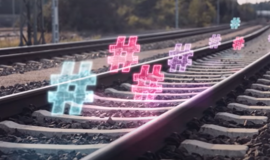
Digitalisation of seven regional lines: €500m programme rolls out
Deutsche Bahn, together with the rail industry and authorities, accelerates joint initiative for new technology on the rail network in 2021 • Digitalisation will make the network more robust: so passengers and freight customers benefit from more punctual trains and increased capacity • Modern technology will replace legacy equipment by 2035 – five years earlier than planned
In 2021, the German government, Deutsche Bahn (DB) and the rail industry united to drive forward the digitalisation of the rail network. This year, DB, together with the German Railway Industry Association (Verband der Bahnindustrie in Deutschland e.V. or VDB), will equip seven regional routes with modern technology. The new technology replaces various legacy systems in North Rhine-Westphalia, Rhineland-Palatinate, Thuringia and the Free State of Bavaria. This will enable more trains to run on existing tracks, while improving reliability and punctuality.
The contract is being financed by the federal government's coronavirus stimulus package, which provides for additional investments of over €500m. In 2020, the Federal Ministry of Transport and Digital Infrastructure, together with DB and VDB, agreed on the use of these funds and an accelerator programme. €100m was invested last year, and the remaining €400m will be released this year. The accelerator programme will also give a boost to the retrofitting project. By 2035 – five years earlier than planned – the digital technology will be installed across Germany to make the already environmentally friendly rail yet more efficient. Both passengers and freight customers will benefit from improved quality and capacity.
Seven industry bodies signed the first contracts of the ‘fast-track’ programme with DB Netz AG. For industry, the programme brings a stable flow of orders. Many innovations are being used for the first time, new companies are joining, and digital technology standards are being established. For industry, this investment programme means it can secure numerous jobs during the pandemic period.
Ronald Pofalla, DB Board Member for Infrastructure: "We are now in turbo mode with Digitale Schiene Deutschland (DSD). In close cooperation with the railway industry, we are digitalising signal boxes in seven German regions this year. Rail passengers and freight traffic will benefit from a more extensive and reliable rail service."
Enak Ferlemann, Parliamentary State Secretary to the Federal Minister of Transport and Digital Infrastructure: "DSD is rapidly picking up speed. That is undeniable. Now we must use the experience gained from the pilot projects to reduce costs and construction times even further in the realisation of digital signal boxes. At the same time, we are looking at broadening the approach of the DSD, for example to be able to implement the German phase even faster through digital capacity management. In this way, the DSD makes an important contribution to our central railway policy goal of getting more traffic onto the railways."
Andre Rodenbeck, President of the German Railway Industry Association: "With the DSD programme, the industry is revolutionising the area of sustainable mobility, 'Made in Europe'. Progressive digitalisation enables us to operate more trains on the same route. And more rail simply means more climate protection. The rapid implementation of the fast-track programme shows this clearly. The technology is ready – we are poised to usher in a new era of rail transport with digitalisation and automation. For better climate protection, for a whole new travel experience and a strong economy."
Gerald Hörster, President of the Federal Railway Authority: "This programme offers an opportunity for the railways, the rail industry and authorities to further optimise approval processes on the basis of manageable projects, and thus be better prepared for a wider rollout."
Background
In early December 2020, in a financing agreement with the railways, the federal government made additional funds available for digital signal box technology. Funds of €500m are available until the end of 2021 from the economic stimulus package created to combat the impact of the coronavirus pandemic. The digitalisation of the rail network creates industrial jobs and supports medium-sized German companies that work to supply the rail infrastructure business. Digitalisation transforms travel and helps protect the environment. Those who travel by rail already travel largely CO2-free. With smart, digital interlockings, more trains can be used on the same route. In the shortest possible time, many more people can use environmentally friendly rail and a significantly higher amount of goods can be transported on the tracks.